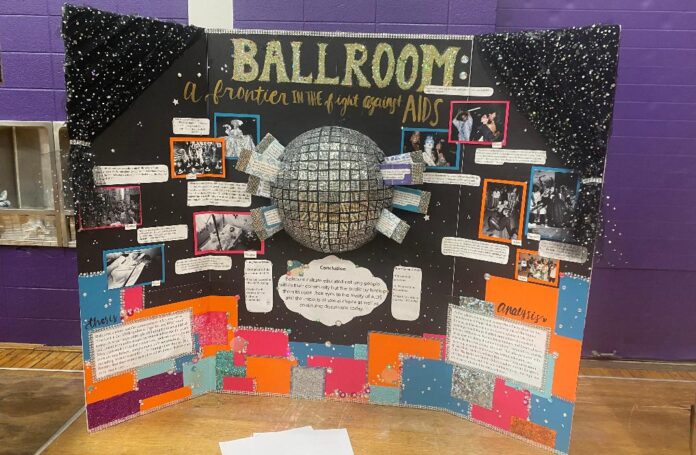In a push to encourage Pennsylvania high-school students to explore topics in LGBTQ+ history, the LGBT Center of Central PA History Project, the PA LGBT History Network and the Army Heritage Center Foundation co-sponsored the second annual Pennsylvania LGBTQ+ History Prize. The prize recognizes a distinguished entry in any medium, including a written paper, documentary, performance, exhibit or website created by a high-school junior or senior that centers on a topic in LGBTQ+ history.
The winning project was “Ballroom: A Frontier in the Fight against AIDS,” created by Carlisle Area High School students Alyanna Montgomery, Laura Sands and Marissa Stambaugh. The project “The Category is…Frontiers: How the Harlem Ball Scene Redefined Queer Black Power,” by Masterman High School students Cyrus Fisher and Jason Zhang, received an honorable mention.
The awards were presented at National History Day in Pennsylvania, at a ceremony at the University of Scranton on April 23. Jasmine Clark, a librarian in Africology and African American Studies at Temple University, judged the entries.
“The quality of research was very impressive,” Clark said about the winning project. “There was also really high amounts of creativity.”
Clark described the winning entry as a half disco ball attached to a poster, but instead of rays of light, tabs were attached with written facts, statistics and quotes from people who lived through the HIV/AIDS pandemic. The students included photos of people who were alive in the early years of HIV/AIDS, including those who passed away.
“They looked at ballroom as a public-health space,” Clark added. “Anyone who is familiar with public-health research, especially around HIV and AIDS, is familiar with how hefty a topic that is, especially how dark that can get for teenagers. You could tell they just handled a very advanced topic very well. That was really the determining factor: the level of research was very intense, particularly for high schoolers.”
The project that got honorable mention consisted of a vogue performance with costuming, as well as a presentation on racial discrimination in the ballroom scene.
“They took the time to really analyze a little bit more deeply within queer history and culture, and also acknowledged the roots of these things that have become heavily associated with queer history and culture, but in essence started in marginalized communities,” Clark said. “They detailed how that was increasingly taken away from communities or how it increasingly discriminated against the very communities that started it. It was nice to see students talk about ballroom without fetishizing it, from a more critical lens in a way that was truly respectful of the founders.”
Both Clark and Barry Loveland, chair of the History Project at the LGBT Center of Central PA, pointed out the importance of students learning about LGBTQ+ history in a landscape where politicians and parents are vying to prevent LGBTQ+ educational topics from being taught in schools.
“We need to encourage students, faculty and teachers to prioritize this as a topic, that it’s legitimate, that it’s important, that it’s vital for young LGBTQ kids to be able to study and learn about the history of their community,” Loveland said. “It’s really a way to incentivize not only the students but the schools to make sure that it’s possible to study topics like this.”
Earlier in 2023, a bill was introduced in the Pa. House that would ban classroom instruction on sexual orientation and gender identity for kindergarten through fifth grade, but it has yet to advance. Book bans, which often involve censoring LGBTQ+ content, are becoming increasingly prevalent. According to PEN America, the rate of book banning increased by 28% during the first half of the 2022-23 school year compared to the previous six months. Pennsylvania ranks third in terms of the number of book bans by state.
“It’s important that we continue to legitimize LGBT gender studies,” Clark said. “Whether it be history or even public health, the students are realizing that these are topics that need their attention, that we’re producing the next generation of people who are interested in really serving those communities. Students should be rewarded for that and also we need to normalize it.”
Clark also acknowledged that it is particularly challenging for students to carry out research for projects on LGBTQ+ topics, such as the history of HIV/AIDS, because many materials on the subject are censored for high-school students.
“It was very impressive to see the level of research the students managed to accomplish, especially because I know they are censored in school databases,” Clark added. “They would have had to go above and beyond to find some of the information and some of the photos they had there.”
